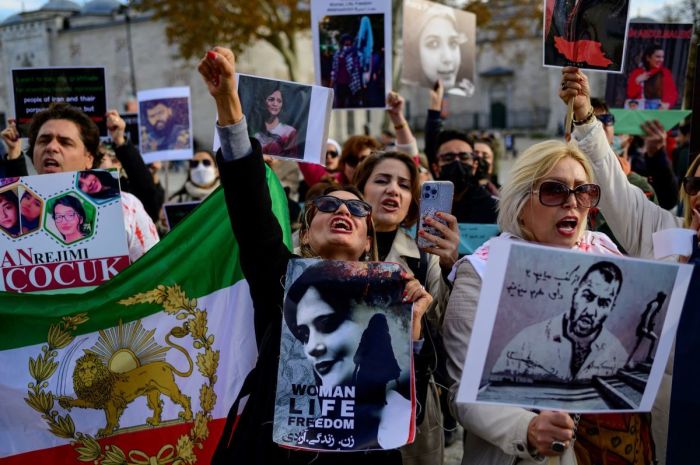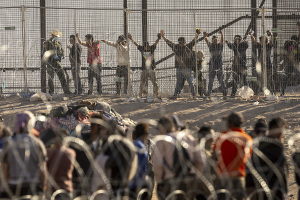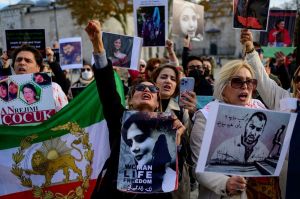Iranian Christians fleeing persecution face 'uncertain future' as Georgia rejects asylum claims

Iranian Christian Jalal Darzi is preparing for the worst after authorities in Georgia rejected his asylum claim, a plight an increasing share of Iranian Christian converts hoping to escape persecution face as some are even being told to halt their church services.
Darzi was rejected after his second interview with Georgian officials on the basis that he had not been able to prove he is a Christian. He says the questions he was asked were geared toward Orthodox Christianity, of which he had no knowledge. When he tried to speak about his beliefs, he said he was not permitted.
"[The interviewer] said: 'When I have a question, you should answer.' A lot of times, she stopped me. I said, 'Let me talk!' But she stopped me, so I didn't carry on. I felt like it was a kind of formality, that obviously they'd made a decision before the interview," Darzi recently told investigators for a joint report compiled by leading human rights organizations.
Released Monday by Article18, Christian Solidarity Worldwide, Open Doors and Middle East Concern, the document highlights the plight of Iranian Christians fleeing persecution in their home country being rejected for asylum in nearby Georgia because their faith is found not to be "genuine."
Despite the threat of persecution in Iran, the report states that Georgia's immigration services over the past three years have accepted less than 1% of the more than 1,000 Iranians who have applied for asylum.
"The asylum-seekers, therefore, face an uncertain future, with little hope of being recognised as refugees but having few alternative options to access international protection," the report said. "Several individuals whose asylum claims have been rejected in Georgia have already spent years as refugees in neighboring countries such as Turkey, and say they no longer know what to do, nor where to go."
Nearly one-fifth of all individuals seeking asylum in Georgia are Iranian. While Turkey is the most common destination for Iranian asylum seekers, more Iranians have sought alternative countries like Georgia as Turkey's conditions for minority faiths have worsened.
Despite the Islamic Republic of Iran's claims that it protects the rights of Christians, Christian converts and other followers of Christ are still subjected to arrest, in some cases, for "propagating a religion contrary to Islam." In Iran, it is illegal to have a Farsi-language Bible or convert from Islam to Christianity. It is unlawful for people even to have contact with Christians who converted from Islam. Those who are converts or are caught supporting converts are often sent to prison on national security charges.
Article 18 confirmed to The Christian Post that it personally knows the individuals featured in the report, noting that some have studied with the Pars Theological Centre, a Persian-language theology school in London.
The report notes that approximately 85% of Georgia's population identifies as Orthodox Christian. The religious freedom advocacy groups suggested that one of the reasons for the rejection of various applications is due to "intolerance of expressions of Christianity other than Georgian Orthodox."
Another reason for the rejection of applications, according to an anonymous asylum lawyer, is due to Georgia developing a relationship with Iran.
Pastor Reza Fazeli told investigators the Georgian Secret Service summoned him in July 2024 for a meeting where he was told that Georgia's commitment to the Vienna Convention on Diplomatic Relations outweighed its commitment to the Refugee Convention, according to the report.
"They said the diplomatic relationship was more important: that it came first for them, and that 'secondly we must obey the refugee and asylum seeker rules,'" the pastor said.
During this meeting, the report states that Fazeli was ordered to close his church and "refrain from gathering with others in groups of more than five, and from conducting interviews with any news agencies." The pastor's church remained shut at the time of the report's writing.
Trade between Georgia and Iran officially amounted to $270 million in 2023, which could "unofficially" amount to $500 million, the report notes.
"So, for the Georgian government, Iran is very important, and if you are a small country and you need to make a good relationship to your big neighbour [Iran], you cannot give that neighbour's citizens refugee status," an unnamed attorney is quoted as saying.
"In all the times we go to court [for cases involving Iranian Christians], the [Georgian] migration department tells the court that Christians don't have any problem in Iran, and that if Christians go back to Iran, they won't have any problem," the lawyer continued.
As for Darzi, he has been able to find work in Georgia and has built relationships with his neighbors, but he cannot stay because he cannot obtain residency or insurance. He is currently trying to appeal against the rejection of his asylum claim but said he is also making plans in case he's ordered to leave.
After Darzi has seen the appeals of friends rejected, he is skeptical and looking to prepare for what may come next.
"I think I might have one year to decide. Maybe my first appeal will take place in six months, and then the second after another six months. I'm trying to figure out where I should go because a lot of my friends have already left, and the guy who first suggested I come here has just one month before [he found out] he must leave the country," he said. "I asked him: 'Where are you going to go?' And he said: 'I don't know.'"
The advocacy groups included several recommendations in the report, including calls for officials to recognize the "diversity of Christian belief" when assessing if an individual's conversion is genuine. In addition, the organizations recommended that officials refer to the United Nations Special Rapporteur's reports on Iran when "determining whether asylum claimants have a well-founded fear of persecution if they were to return."
The groups call on Georgian authorities to not only recognize the persecution Christians face in Iran but also for the international community "to open up new safe, legal routes for resettlement."
Samantha Kamman is a reporter for The Christian Post. She can be reached at: [email protected]. Follow her on Twitter: @Samantha_Kamman




























